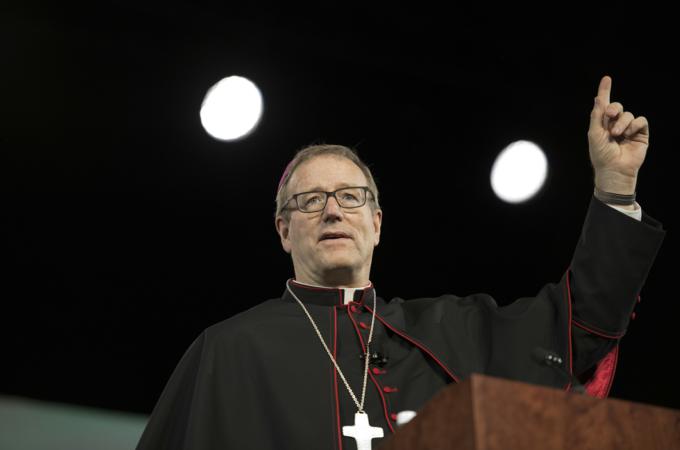An evangelical path
I commenced my writing career, roughly 25 years ago, as a critic of liberal Catholicism, which I referred to, in one of the first articles I ever published, as "beige Catholicism." By this designation, I meant a faith that had become culturally accommodating, hand-wringing, unsure of itself; a Church that had allowed its distinctive colors to be muted and its sharp edges to be dulled. In a series of articles and talks as well as in such books as "And Now I See," "The Strangest Way," and especially "The Priority of Christ," I laid out my critique of the type of Catholicism that held sway in the years after the Second Vatican Council as well as my vision of what a renewed and evangelically compelling Church would look like. I emphasized Christocentrism as opposed to anthropocentrism, a Scripture-based theological method rather than one grounded in human experience, the need to resist the reduction of Christianity to psychology and social service, a recovery of the great Catholic intellectual tradition, and a robust embrace of evangelical proclamation. In all of this, I took as my mentor Pope John Paul II, especially the sainted pontiff's interpretation of Vatican II as a missionary council, whose purpose was to bring Christ to the nations.
My media ministry Word on Fire developed as the practical expression of these theoretical convictions. I did not want simply to name a problem and speculate about a solution; I wanted, above all, to contribute concretely to that solution. Hence I produced videos on a wide variety of theological and cultural themes; created long-form documentaries that conveyed the truth and beauty of Catholicism; preached biblically on radio, television, and the internet; and eventually developed an institute for the formation of lay evangelists in the Word on Fire spirit. All of this constituted a response to the beige Catholicism that I identified as problematic many years before. I have never changed my mind about Catholic liberalism, and I continue to see it as, in the words of my mentor Francis Cardinal George, "an exhausted project."
But the same Cardinal George who strongly criticized the liberal strand within Catholicism also said this: "Conservative Catholicism in some of its reaction takes refuge in earlier cultural forms of faith expression and absolutizes them for all times and all places." Thoroughly imbued with the missionary spirit of Vatican II, the Cardinal knew that a hyper-valorization of any particular period of Church history, be it the American Catholicism of the 1950s or the European Catholicism of the 13th century, would seriously undermine the Church's present capacity to engage the culture in which it finds itself.
In recent years, a fiercely traditionalist movement has emerged within American Catholicism, finding a home particularly in the social media space. It has come about, partly, as a reaction to the same beige Catholicism that I have criticized, but its ferocity is due to the scandals that have shaken the Church the past 30 years, especially the McCarrick situation. In their anger and frustration, some of it justified, these arch-traditionalist Catholics have become nostalgic for the Church of the pre-conciliar period and antipathetic toward the Second Vatican Council itself, Pope John XXIII, Pope Paul VI, Pope John Paul II, Pope Benedict XVI, and, particularly, our present Holy Father.
The supreme irony, of course, is that these radically traditionalist Catholics, in their resistance to the authority of the pope and their denial of the legitimacy of an ecumenical council, have risked stepping outside the confines of the Church. Theirs is not a beige Catholicism to be sure, but it is indeed a self-devouring Catholicism. Perhaps sensing this contradiction, they remain spitting-mad at anyone who would dare challenge them.
If I might then nail my colors to the mast, Word on Fire represents a "No" to both beige and self-devouring Catholicism. It stands with Vatican II, John Paul II, Pope Francis, the "Catechism" of 1992, and it takes as its mission the New Evangelization. It wants neither to surrender to the culture nor to demonize it, but rather, in the spirit of St. John Henry Newman, to engage it, resisting what it must and assimilating what it can, being, as St. Paul put it, "all things to all people . . . For the sake of the Gospel" (1 Cor. 9:22--23). Against self-devouring Catholicism, it is intellectually generous, but against beige Catholicism, it desires to make all thoughts finally captive to Christ. Against the angry denizens of the Catholic right, it seeks not to condemn but to invite; against the representatives of the too-complacent Catholic left, it sees evangelization as the centrally important work of the Church.
Cardinal George said that liberal Catholicism is "parasitical upon a substance that no longer exists," by which he meant that it subsists as a critique of a form of Catholic life that has mostly faded away. I have argued that the extreme traditionalist Catholicism of the present day is self-consuming, for it attacks the very foundations of Catholicism itself. If both of these characterizations are true, then these two critical movements are essentially moribund. I have tried to situate Word on Fire on the path of an evangelical Catholicism, the Catholicism of the saintly popes associated with Vatican II, a living Catholicism.
- Bishop Robert Barron is the founder of the global ministry, Word on Fire, and is an Auxiliary Bishop in the Archdiocese of Los Angeles.



















